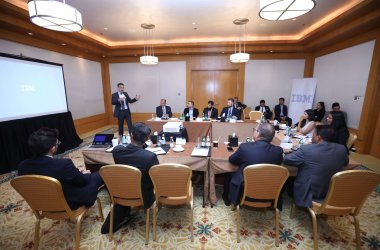Following IBM’s February announcement that Watson – its groundbreaking artificial intelligence computer system – will carry out its first commercial application at a New York cancer centre, Bob Guidotti, GM, WW Software Sales, IBM, tells CNME the technology will change the face of IT.
You wouldn’t think that something developed to answer questions on famous American quiz show Jeopardy! would be the next big innovation ready to take the enterprise by storm.
But that’s exactly what the folk at IBM have been saying, and the claim gained a barrage of credibility last month when the corporation announced the system will be used for utilisation management decisions in lung cancer treatment at Memorial Sloan–Kettering Cancer Center in New York City.
Watson first gained headlines in 2011 when it competed against former winners on Jeopardy!. The system –which is able to answer questions posed in natural language – had access to 200 million pages of structured and unstructured content consuming four terabytes of disk storage, including the full text of Wikipedia. It was not connected to the Internet during the game, but consistently outperformed its human opponents and took victory.
Two years on, IBM has shrunk Watson from the size of a master bedroom to a pizza-box-sized server that can fit in any data centre, and improved its processing speed by 240%.
Its first commercial application is a clear sign it is ready to become a real business for IBM. And not just in the healthcare industry, according to Guidotti, who was at Yas Island last month for IBM Software Day 2013.
“Another area we are focusing the technology is in help desks,” he says. “If we can improve the customers experience by understanding why they’re calling in and looking at data behind as to what caused the problem, we can start making recommendations as to how to improve the overall customer experience of calling in.
“If we can avoid the call from coming in the first place then that really improves customer satisfaction.”
IBM sees Watson as the “end game” of where enterprise technology is moving to over the next five years. Until then, CIOs should be doing a range of things to prepare, which is where big data comes in.
“A lot of it has to do with how they are doing the data collections and pulling together the information about their business,” Guidotti says. “We’ve found with big data strategies that they shouldn’t just be a matter of having a data warehouse – there should also be data about historical impact on things.
“We think this whole big data concept will give us major information to transform into Watson. We need to combine two things. We need all the data information, but then we also need the how-to information. Each individual business is slightly different. We cannot put that into the computer because it is something the customer has to add in.
“So the CIOs responsibility is to get the data in place. The business side has to start understanding how they’re going to document and run the business into Watson so that we can combine those two. One without the other is worthless.”
With this in mind, and in consideration for moving into the next level of computing, Guidotti believes big data should be the number one priority for CIOs in the Middle East.
Before that can happen, the region needs to get over the awareness barrier that is preventing CIOs from fully understanding both what big data is and what it can do, he says.
“Today we have people in the industry saying they can deliver big data, but all they’re talking about is data warehousing. So we need to be able to picture for people what all of the components of big data are and then start making sure people understand they have decisions to make.
“Then on top of big data is the analytics. People are thinking just because they have collected the data that they can do something with it. You need to have the smarter analytics in the different formats that are required to move to the next step.
“We’re talking about a new era of computing – a real ‘holy smokes moment’ in what technology will mean over the next five years.”






